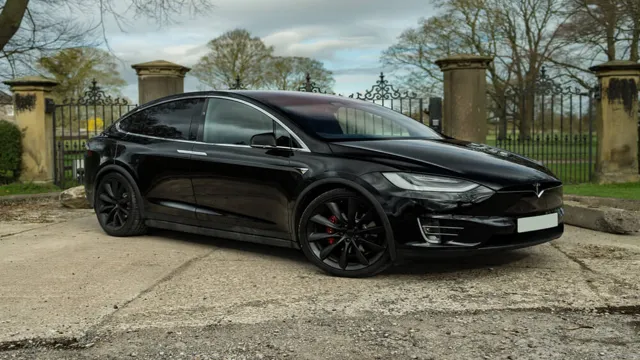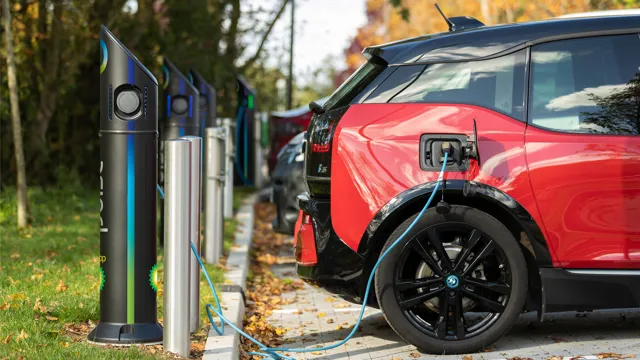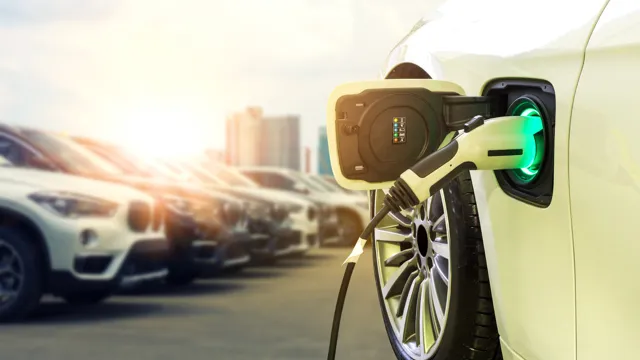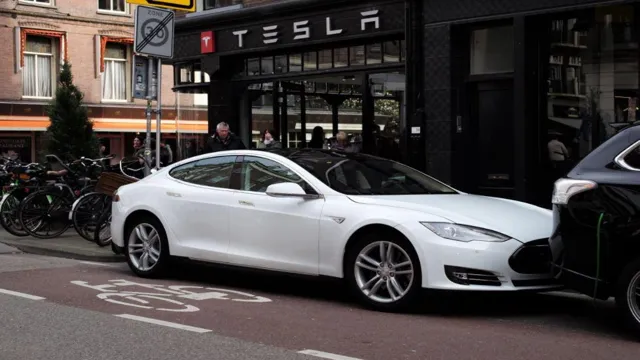Saving More Than Just the Environment: The Monetary Benefits of Electric Cars Explained
Electric cars are becoming more and more popular nowadays, and there are good reasons why. Apart from being environmentally-friendly and contributing to a greener Earth, electric cars are beneficial for your wallet. Unlike traditional gas-powered cars that require frequent trips to the gas station, electric cars can save you money in the long run by reducing fuel costs.
In this blog post, we’ll explore the benefits of electric cars and how they can help you save money while providing a comfortable and efficient driving experience. Are you ready to learn more about this revolutionary way of traveling around? Let’s delve into the topic and find out!
Lower Fuel and Maintenance Costs
One of the biggest benefits of electric cars is the monetary savings they offer on fuel and maintenance costs. Unlike gasoline-powered cars, electric cars rely on electricity which is significantly cheaper than gasoline. This allows electric car owners to save a considerable amount of money on fuel costs over their lifetime.
Additionally, electric cars typically have fewer moving parts and require less maintenance than traditional cars. This translates to lower maintenance costs and fewer visits to the repair shop. With lower fuel and maintenance expenses, electric car owners can keep more money in their pockets and enjoy the long-term cost savings offered by their environmentally-friendly vehicles.
So, if you’re looking for a car that saves you money in the long run, an electric car might be the perfect choice.
Electricity vs Gasoline Cost Comparison
When it comes to the cost of fuel and maintenance, electricity is the clear winner over gasoline. Electric vehicles have much lower fuel costs and require less maintenance than their gasoline-powered counterparts. In fact, the cost of charging an electric vehicle is typically half the cost of filling up a gasoline tank, and the cost savings only increase when considering the reduced maintenance requirements of an electric motor.
While gasoline engines require regular oil changes, tune-ups, and other costly maintenance, electric motors are much simpler and require very little upkeep. So, not only is it better for the environment, switching to an electric vehicle can also save you money in the long run. Why not make the switch and start saving today?

Less Frequent Maintenance Needed
Lower Fuel and Maintenance Costs One of the most significant benefits of modern vehicles is that they require less frequent maintenance than older models. This means that not only do you save money on fuel, but you also save money on repairs and other related expenses. The reason for this is that there has been a lot of advancement in the materials used to build modern vehicles.
Cars are now made with durable materials that require less maintenance and have a longer lifespan. This also means that you don’t have to worry about replacing car parts as frequently as you used to. The decrease in maintenance and repair costs can significantly reduce the overall expenses associated with car ownership.
In addition, modern cars are designed to be fuel-efficient, which means that you spend less money on gas. With such cost savings, owning a car has never been more affordable!
Tax Credits and Incentives
One of the key benefits of electric cars is the monetary incentives and tax credits that come with their purchase. As governments around the world seek to reduce carbon emissions and promote clean energy, they often offer rebates and incentives to encourage people to buy electric vehicles. These can take many forms, from cash-back incentives to lower car registration fees, and can add up to thousands of dollars in savings over the lifetime of the vehicle.
In addition, many workplaces now offer charging stations for electric cars, reducing the cost and hassle of charging at public stations. Whether you’re purchasing an electric car for environmental reasons or simply to save money, these monetary benefits make it an attractive option for many drivers. So if you’re in the market for a new car, be sure to consider the many advantages of an electric vehicle, including the potential for significant cost savings.
Federal Tax Credits for EV Purchase
If you’re considering purchasing an electric vehicle (EV), you may be eligible for some federal tax credits and incentives. These credits and incentives are offered as a way to encourage more people to switch to environmentally-friendly vehicles. The federal government offers up to $7,500 in tax credits for the purchase of new qualifying EVs.
However, the exact amount of the tax credit will depend on the battery capacity of the EV you purchase. Additionally, some states offer additional incentives on top of the federal tax credit. For instance, California offers several incentives such as rebates, HOV lane access, and free charging station access.
If you’re curious about what incentives are available in your state, it’s worth reaching out to your local dealership or checking out the Department of Energy’s website for more information. Overall, these incentives can make buying an EV a financially smart decision, all while helping the environment.
State and Local Incentives
When it comes to investing in renewable energy, many states and local governments offer tax credits and incentives to help offset the costs. These incentives can include property tax exemptions, income tax credits, and rebates for installing renewable energy systems. For example, some states may offer a tax credit for a certain percentage of the cost of solar panels or other renewable energy systems installed on a property.
Other incentives may include grants for research and development of new renewable energy technologies. These incentives can be a significant help for individuals and businesses looking to invest in renewable energy while also helping to reduce their carbon footprint. However, it’s important to do your research before making any investment decisions to ensure that you fully understand the incentives available and the requirements for eligibility.
With the right support, investing in renewable energy can be a smart move for both our wallets and our planet.
Lower Insurance Rates
Lower insurance rates are a highly sought after benefit for many individuals and businesses. There are several tax credits and incentives available to help you achieve these savings. One such incentive is the Health Coverage Tax Credit (HCTC).
This tax credit applies to those who qualify, providing assistance with healthcare premium costs. Additionally, certain businesses may be eligible for the Small Business Health Care Tax Credit. This credit provides employers with up to 50% of the cost of employee premiums.
These incentives, along with other opportunities like wellness program participation, can help lower insurance rates for individuals and businesses alike. When searching for insurance options, it’s important to research and take advantage of all available tax credits and incentives to ensure you are getting the best rates possible.
Resale Value and Long-term Savings
One often overlooked monetary benefit of electric cars is their resale value and long-term savings. Electric vehicles tend to retain their value better than gas-powered cars, with some models even holding up to 70% of their value after three years. This is due to a few reasons such as the lower cost of maintenance and repairs compared to traditional cars.
Long-term savings can also be achieved with electric vehicles, as owners can save on fuel costs and tax incentives. Electric cars have lower operating costs because electricity is cheaper than gas, resulting in an estimated $1,000 – $2,000 savings per year. There are also tax credits and incentives available for electric car purchases, which can save owners thousands of dollars over the life of the vehicle.
This makes buying an electric car a wise investment for the future, not just for the planet but also for your pocketbook.
Electric Cars’ Comparable Resale Value
One of the concerns for electric car owners is the resale value. However, recent studies have shown that electric vehicles have comparable resale value to their gasoline-powered counterparts. This is good news for those who are considering purchasing an electric car, as it means that their long-term savings won’t suffer due to depreciation.
Additionally, many electric car manufacturers offer generous incentives for purchasing their vehicles, such as tax credits and rebates. When you combine these incentives with the comparable resale value, it’s clear that electric cars can be a smart financial choice. It’s worth noting that factors such as the car’s age, mileage, and condition will still impact its resale value, but overall, electric cars have proven to hold their value quite well.
So if you’re looking to save money in the long run while also reducing your carbon footprint, an electric car may be an excellent investment.
Potential Long-term Savings Compared to Gas Cars
When it comes to long-term savings, electric cars tend to outperform their gas counterparts. The reason? Resale value. The resale value of electric cars tends to hold up exceptionally well over time, leading to greater long-term savings.
Gas cars, on the other hand, tend to depreciate in value quickly, meaning that you’ll get less money when it comes time to sell or trade in your vehicle. Additionally, electric cars have lower maintenance costs than gas cars, saving you money on oil changes, brake replacements, and other routine maintenance tasks. While the upfront cost of purchasing an electric car may be higher than a gas car, the long-term savings can make it a worthwhile investment.
Plus, knowing that you’re doing your part for the environment can be a feel-good bonus. So, if you’re looking to save money in the long run and reduce your carbon footprint, an electric car may be the way to go.
Conclusion
In conclusion, the benefits of electric cars on your wallet are electric! Not only do they save you money on gas and maintenance costs, but they also qualify you for tax credits and may even increase the resale value of your vehicle. Plus, who doesn’t love the feeling of driving past a gas station without having to stop? So, go green in more ways than one and switch to an electric car – your bank account will thank you!”
FAQs
What are the monetary benefits of owning an electric car?
Electric cars offer significant monetary benefits, including lower fuel and maintenance costs, federal tax credits and rebates, potential state and local incentives, and potentially higher resale value.
How much can I save on fuel costs with an electric car compared to a gas-powered car?
The amount you can save on fuel costs with an electric car depends on various factors, including your driving habits, the cost of electricity in your area, and the efficiency of your electric car. Some estimates suggest that electric cars can be up to five times cheaper to fuel than gas-powered cars.
Are there any tax credits or rebates available for purchasing an electric car?
Yes, there are federal tax credits and rebates available for purchasing an electric car, ranging from $2,500 up to $7,500, depending on the make and model of the car. Some states and local governments also offer incentives for electric car purchases.
Do electric cars have higher resale value compared to gas-powered cars?
Yes, electric cars typically have higher resale value compared to gas-powered cars. This is due to various factors, including their lower maintenance costs, longer lifespan of batteries, and increasing demand for electric cars in the market.




